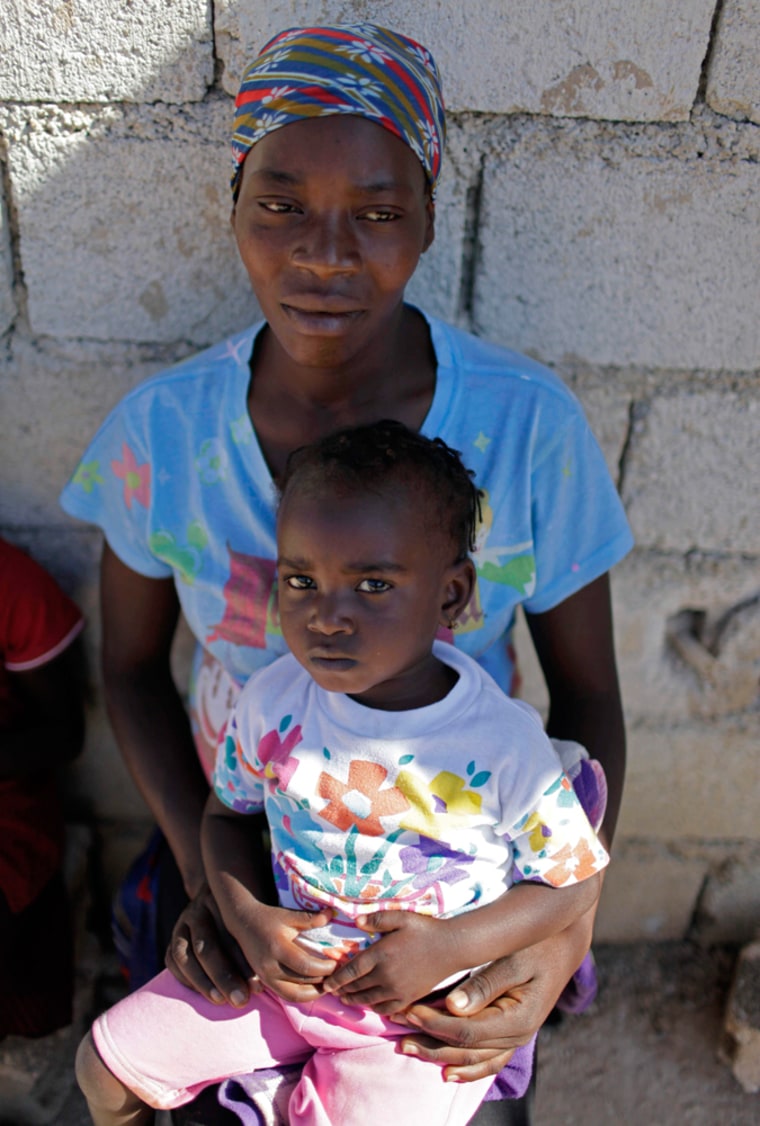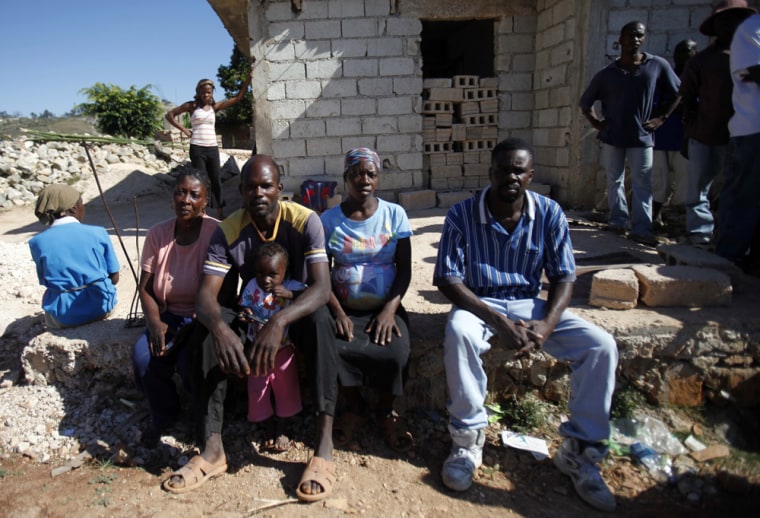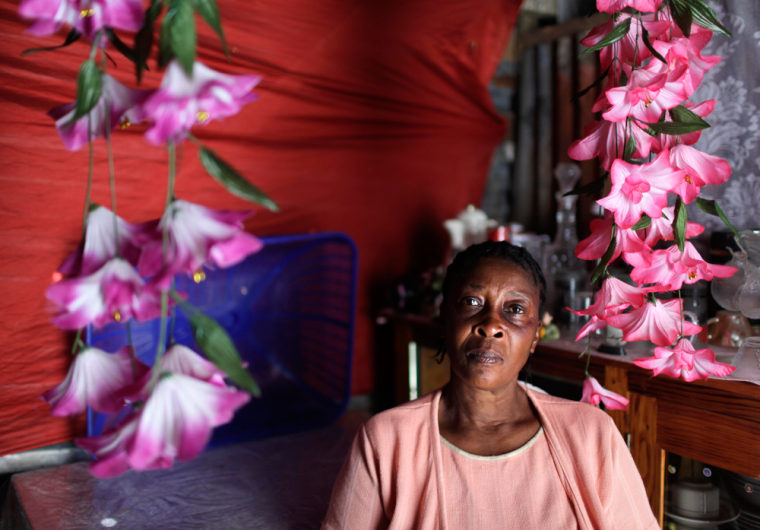Parents in this struggling village above Haiti's capital said Wednesday they willingly handed some 20 of their children to American missionaries who showed up in a bus promising to give them a better life — contradicting claims by the Baptist group's leader that the children came from orphanages or distant relatives.
The 10 Baptists, most from Idaho, were arrested last week trying to take 33 Haitian children across the border into the Dominican Republic without the required documents, according to outraged Haitian officials, who have called them child traffickers.
An investigating magistrate was questioning the five men Wednesday after interrogating the women a day earlier, according to Haiti's communications minister. No lawyers were present.
Minister Marie-Laurence Jocelyn Lassegue said the judge will present his findings to a Haitian prosecutor, who will then decide whether to file criminal charges against the 10 Americans.
The prosecutor said he would announce that on Thursday. "Tomorrow, my decision will be known. Tomorrow, everybody will know what we decide," Mazarre Fortil said Wednesday.
Children surrendered on Jan. 28
Most of the children appear to be from Callebas. Parents there told The Associated Press they surrendered their children on Jan. 28, two days after a local orphanage worker acting on behalf of the Baptists convened nearly the entire village of about 500 people on a dirt soccer pitch to present the Americans' offer.
The orphanage worker, Issac Adrien, said he told the villagers their children would be educated at a home in the Dominican Republic so that they might eventually return to take care of their families.
Many parents jumped at the offer. The village school had collapsed and their homes were destroyed in Haiti's catastrophic Jan. 12 quake, and they had no money to feed the children, they said.
"It's only because the bus was full that more children didn't go," said Melanie Augustin, a 58-year-old who gave her 10-year-old daughter, Jovin, to the Americans. Ironically, Augustin had adopted Jovin because her birth parents couldn't afford to care for her.
Adrien said he brought the Americans to the village after meeting their leader, Laura Silsby of Boise, Idaho, at a school in Port-au-Prince two days earlier.
Silsby said she was looking for homeless children, Adrien said, adding that he went that very day to talk to the parents in Callebas.
American didn't mention parents
In a jailhouse interview Saturday, Silsby told the AP that most of the children had been delivered to the Americans by distant relatives, while some came from orphanages that had collapsed in the quake.

The missionaries' lawyer, Jorge Puello, told the AP on Wednesday "they willingly accepted kids they knew were not orphans because the parents said they would starve otherwise."
The parents of four children taken by Silsby said the Americans took down contact information for all the families and assured them that a relative would be able to visit them in the Dominican Republic.
Silsby's Central Valley Baptist Church in Meridian, Idaho, had begun planning last year to build an orphanage, school and church in Magante, on the northern coast of the Dominican Republic. Their plan was to work with U.S. adoption agencies to find "loving Christian parents" for Haitian and Dominican children. When the quake struck, the church members decided to act immediately, renting a hotel in a nearby Dominican beach resort and hiring a bus to collect children from the disaster area.
Adrien said he had no knowledge of the group's larger plans; villagers said they were told none of their children would be offered for adoption.
Laurentius Lelly, a 27-year-old computer technician, said he gave up his two children, ages 4 and 6, because Silsby had previously visited the area and earned people's trust.
Lelly said he is no longer so sure about her trustworthiness, and said he was worried the Haitian judicial system would fail to properly investigate the case. No Haitian police or social welfare investigators have visited the village since the Americans were arrested at the border, the parents said.

"I would like to find out if these people were really going to help the kids or were trying to steal them," Lelly said.
Most parents said they wouldn't know what to do if they had to take the children back.
"I am living in a tent with a friend," said Lelly, who said most of his wife's close relatives were killed. "My main concern is that if the kids come back I'm not going to be able to feed them."
The Baptists say they were only trying to help orphans survive the earthquake. But legal experts say taking children across a border without documents or government permission can be considered child trafficking.
In Washington, Secretary of State Hillary Rodham Clinton said Wednesday that the Americans should have followed proper procedures. "We know how to do this in the right way," Clinton said. "It was unfortunate, whatever the motivation, that this group of Americans took matters into their own hands."
At the SOS Children's Village orphanage where authorities are protecting the 33 children, regional director Patricia Vargas said none who are old enough and willing to talk said they are parentless. "Up until now we have not encountered any who say they are an orphan," she said.
‘Homeless and hopeless’
But a Haitian-born pastor who accompanied the Baptist group insisted Wednesday that the Americans had done nothing wrong, and that any with living parents had been sent with the knowledge they would have a better life and would still be able to see their relatives.
"When we think orphanage, it's someone without a mother and father. In Haiti, it's not the case," the Rev. Jean Sainvil said, noting that many children in orphanages have been put there by parents who cannot care for their children.
"These parents are homeless and hopeless," he said. "Everybody agreed that they knew where the children were going. The parents were told, and we confirmed they would be allowed to see the children and even take them back if need be."
He said the children whose parents were still alive were to be kept in the Dominican Republic, with plans for their relatives to visit. He said some of those who did not have parents might have been put up for adoption.
The Americans enlisted local clergymen who asked people if they wanted to give away their children, said the director of Haiti's social welfare agency, Jeanne Bernard Pierre.
"One child said to me, 'When they came knocking on our door asking for children, my mom decided to give me away because we are six children and by giving me away she would have only five kids to care for,'" Bernard Pierre said.
'Huge mistake'
Some of the children, said SOS Children's Villages spokesman Georg Willeit, came from an orphanage near the airport.
Prime Minister Max Bellerive has suggested the Americans could be prosecuted in the United States because Haiti's shattered court system may not be able to cope with a trial.
"It is clear now that they were trying to cross the border without papers. It is clear now that some of the children have live parents. And it is clear now that they knew what they were doing was wrong," Bellerive told the AP.
The White House has said the case remains in Haitian hands for now.
Central Valley Baptist Church Assistant Pastor Drew Ham in Idaho called Tuesday for their immediate release, saying questioning them without lawyers violates the Haitian Constitution.
The U.S. government could claim jurisdiction to try them in the United States, but one expert on international abductions doubts it will happen, since prosecutors are likely to take into account the mitigating circumstances.
"They have obviously made a huge mistake by unilaterally going into Haiti and taking children without the permission and knowledge of the Haitian government. It's a crime in Haiti and anywhere in the world to take or abduct children even if the underlying intentions were humanitarian or good in nature," said Christopher Schmidt, an attorney with Bryan Cave LLP in St. Louis.
"Whether or not a prosecutor would choose to prosecute these individuals in this case is an open question. Frankly I have doubts whether a prosecutor would want to go down that path," he said.
